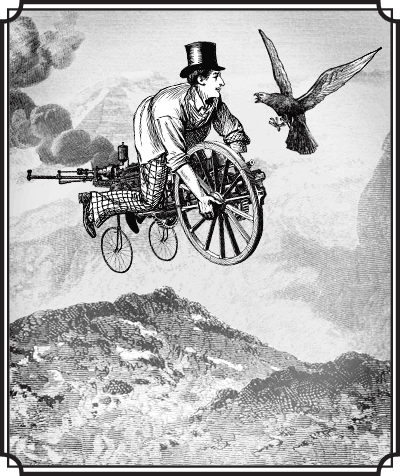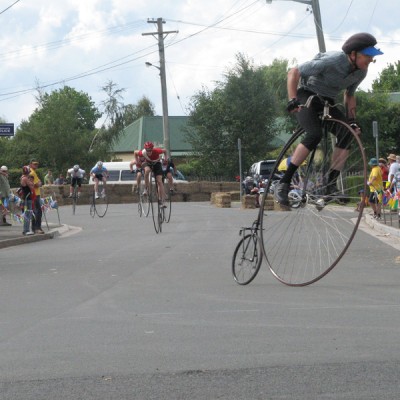
This weekend I’ll be in Seattle, Washington at the charming and intriguing Emerald City Comicon! I will have Wondermark books, some T-shirts and posters, and copies of Machine of Death available to be signed, personalized, vulgarized &c.
Many of my colleagues in internet entertainment will also be there — including many other Machine of Death contributors! In fact, MoD author James L. Sutter will be doing a special signing on Sunday afternoon. More details on that here!
Later on Sunday afternoon, I’ll also be doing a special “True Stuff from Old Books” presentation. If you’ve enjoyed reading the strange articles I’ve dug out of dusty old books, please come check out the live version. I’m quite excited for it, I think it’ll be fun!
Conventions 101
I realized recently that I talk a lot about these conventions and various things that I attend, but some of you may be less familiar with what goes on, or what the point of these events is. Here’s a handy FAQ just off the top of my head — if these spark other questions of your own, please leave a comment on this post and I’ll address them in another installment later.
WHAT’S AT A CONVENTION?
The events I typically attend fall into several distinct categories, but regardless if they’re comic conventions, steampunk gatherings, book fairs, or craft shows, they usually have several things in common:
1. Programming/events/panels. Attendees can hear panel discussions on topics that interest them, or listen to talks or Q&A’s by folks you may not often get to hear from. Depending on the show and the lineup, programming often runs the gamut from concerts, comedy shows and performances to nuts-and-bolts and how-to discussions of an industry or hobby’s finer points.
2. Vendors/exhibitors/dealers. The big comic conventions began as ways for fans to gather and locate hard-to-find books they couldn’t find anywhere else. Now that we have the Internet and eBay, that’s less of a priority, though at comic shows there are usually tons of shops selling back-issues and discounted trade collections. Artists, of course, set up shop as well: it’s a unique chance to interface directly with readers and other creators too, whether to personalize a book, or spread the word to new folks, or just shake hands and put a face to one of the anonymous numbers in a website traffic report. I’m always really delighted to meet readers, because otherwise this job is just me staring at a computer all day long.
3. Social interaction. I know this is a tough one for some, but the most fun part of an event for me is the social aspect. Sometimes there are get-togethers after hours or whatever, but even in the middle of the show itself, it’s super-neat to look around and realize “As opposed to a random slice of the population that you might see in an airport or something — these are all people who share at least some interest with me.” It’s a real power-in-numbers moment. Of course, this realization of commonality can also be terrifying, depending on who in particular you’re looking at right then. Still, there are usually a few great costumes to check out at any decent-sized show.
WHAT SHOULD I DO?
It depends on what you’re after, of course, but I usually recommend: looking at the list of programming and blocking out anything you’d like to see first, so you have a schedule to work around. That’s the stuff that’s time-sensitive.
Then, take a look at the exhibitor list and compare it to the map that’s usually in the program booklet. At smaller shows you can usually wander around the floor and see everything, but at larger shows like San Diego you really need to be aimed in a certain direction, or it’s easy to get lost. Different shows list artists in different ways in the book, and sometimes not at all if they’re at a shared table (the way I’m usually at the TopatoCo table), so it’s also good practice to look for booth numbers ahead of time in any announcements made by artists you expect to be there. At Emerald City, I’ll be at booth 202, but that’s literally right inside the front door so we’ll be pretty hard to miss.
Depending on whom you’re hoping to see, there may be lines. I always recommend standing in lines early, because if someone leaves, or runs out of stock, or gets cholera halfway through the day, you don’t miss out by waiting till later. There’ll be plenty of folks who don’t have lines, so it’s not like you’ll be standing in lines the whole day. (Again, San Diego excepted. That’s a whole different animal, unfortunately.)
If you have something in mind that you would like to pick up at the show, it’s helpful to bring cash, although nowadays most folks take credit cards so it’s not as much of a big deal. We do pay transaction fees on card purchases though, so cash is always appreciated! ATMs at conventions often develop lines and run out of money, so it’s good to plan ahead. But in a pinch, cards are often fine.
Feel free to bring an artist’s book from home to be signed! Artists love doing this, because they love seeing evidence that you’ve read their stuff before. Some artists may charge for this, which I think is kind of a jerky thing to do, but most don’t. (Caveat: If you bring a hundred things from home to get signed and clog up the line because you’re stocking up your eBay store, you’re the jerk.)
I AM SUPER NERVOUS ABOUT TALKING TO SOMEONE I ONLY KNOW FROM INTERNET
Yeah, I get this way too, totally. My only advice is, assume a character who’s someone who’s friendly and confident. I mean, don’t do a funny voice or anything, but do try to step out of yourself for a second. The conversation will be very easy, I promise, because nobody’s out to get you. Everyone likes hearing kind words! PRO TIP: Say kind words.
I’m kind of joking, but sometimes people get a little too comfortable and say things like “I used to read you all the time but now I don’t really bother,” or “My friends really like your strip, but I don’t really get it myself” or, much worse, to a lady they’ll say “MARRY ME AND I WILL WHISK YOU AWAY FROM ALL OF THIS.” The first things are simply nervous and clumsy (this is why it’s nice to rehearse your opening sentence in your head, or come up with a question to open with) and the last thing is creepy. I know you think you are being funny and charming, but the lady will not appreciate this. Do not say this. You will be considered a creep no matter how much you think you should not be. The label is not up to you. Do not do this.
We are all just human beings, remember! If somebody is grouchy after a long day, I apologize right now on their behalf. Usually we’re just as nice as you are. So be polite and friendly and it’ll be great all around!
SOME MORE THINGS NOT TO DO
• Hang around a really long time blocking the booth from other people.
• Pitch your own project at length. If you have samples, most folks are happy to take them and look over them later at their leisure, for whatever good it will do.
• Haggle over prices. It’s not a flea market, and it’s rude.
• Talk to someone you recognize when you’re both in the bathroom.
SOME THINGS TO DEFINITELY DO
• Say hello to an artist whose work you enjoy!
• Hydrate and nourish yourself throughout the day so you don’t get faint.
• Wash your hands frequently if you’ve been shaking people’s hands.
• Bring a camera and take pictures (with permission) of interesting folks you see or meet!
• Bring a backpack (and a poster tube if you like) to carry things that you pick up at the show.
• If you’re getting a free sketch, ask for something simple. Like, one-word simple.
• Participate! Check out a panel, pick up a brand-new book you’ve never heard of, or just tell someone their costume looks really cool.
Hope to see you this weekend, or later in the year at a different show!


![[insert hilarity here]](https://wondermark.com/wp-content/uploads/2011/02/cc-002bird-252x300.png)


